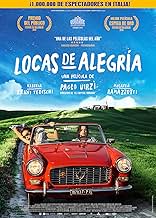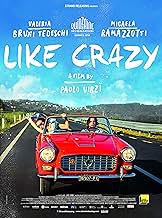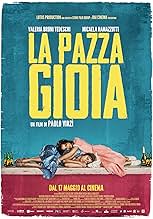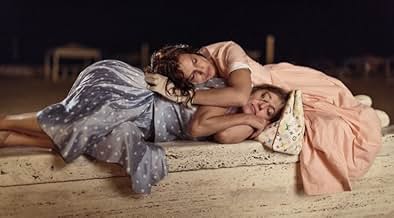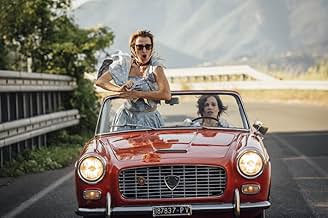IMDb RATING
7.1/10
11K
YOUR RATING
Two quite different women escape a mental institution to see Tuscany in a stolen car and get to know each other.Two quite different women escape a mental institution to see Tuscany in a stolen car and get to know each other.Two quite different women escape a mental institution to see Tuscany in a stolen car and get to know each other.
- Awards
- 30 wins & 30 nominations total
Luisanna Pandolfi
- Luisanna, la caposala
- (as Luisanna Messeri)
Mimma Pirré
- Suor Diletta
- (as Mimma Pirrè)
Featured reviews
Whenever I review a foreign language film, I fully realize many people won't bother watching the picture because it's not in English. This is a shame, as many of the better films I have seen have been in a variety of languages and with "Like Crazy", you'd be missing a very good movie.
The story begins in a psychiatric institution in Italy. Beatrice (Valeria Bruni Tedeschi) is a patient, though she won't admit this to anyone even herself. In her distorted mind, she is a countess and the old mansion used as a hospital was donated by her to treat these unfortunate people! So, while at times Beatrice looks and seems very normal, she is severely deluded and self-absorbed. When a new resident arrives, Beatrice decides to make Donatella (Micaela Ramazzotti) her own personal project. After all, she is a rich, benevolent lady and helping the unfortunates is her life! So how, exactly, does she 'help'? Yep she orchestrates an escape and soon the oddly matched pair are out on a joy ride complete with stolen car.
At this point in the movie, Paolo Virzi (who wrote and directed the picture) could have chosen to make the film a kooky comedy, like "Crazy People" or "The Couch Trip" which is what you might expect with a Hollywood film. Fortunately, "Like Crazy" does not go there but manages to be rather poignant as well as realistic. You learn more about Beatrice and Donatella and their lives outside the institution but there are no magic solutions to their problems. After all, they are indeed very ill and mental illness isn't particularly funny and is often quite tragic. Now this is not to say that ultimately this is a depressing or tragic film and it manages to say quite a bit while still being believable and compelling.
The story begins in a psychiatric institution in Italy. Beatrice (Valeria Bruni Tedeschi) is a patient, though she won't admit this to anyone even herself. In her distorted mind, she is a countess and the old mansion used as a hospital was donated by her to treat these unfortunate people! So, while at times Beatrice looks and seems very normal, she is severely deluded and self-absorbed. When a new resident arrives, Beatrice decides to make Donatella (Micaela Ramazzotti) her own personal project. After all, she is a rich, benevolent lady and helping the unfortunates is her life! So how, exactly, does she 'help'? Yep she orchestrates an escape and soon the oddly matched pair are out on a joy ride complete with stolen car.
At this point in the movie, Paolo Virzi (who wrote and directed the picture) could have chosen to make the film a kooky comedy, like "Crazy People" or "The Couch Trip" which is what you might expect with a Hollywood film. Fortunately, "Like Crazy" does not go there but manages to be rather poignant as well as realistic. You learn more about Beatrice and Donatella and their lives outside the institution but there are no magic solutions to their problems. After all, they are indeed very ill and mental illness isn't particularly funny and is often quite tragic. Now this is not to say that ultimately this is a depressing or tragic film and it manages to say quite a bit while still being believable and compelling.
At first you wonder what a woman like Beatrice Morandelli Valdirana is doing in the Villa Biondi, an institution for women with mental health problems in the Tuscan countryside. She claims to be a Countess, rich, well-connected and knowledgeable. A little bit of a busybody maybe, talkative, inquisitive and demanding but clearly intelligent. It's not long however before you're wondering what on earth they are thinking letting her out to do some part-time work at a plant nursery. Are they mad?
The difference is that Beatrice seems to have hit it off with a new 'inmate', Donatella Morelli, who has been brought in after a suicide attempt. Unlike Beatrice, Donatella is silent, withdrawn and nervous, and has no social connections and only one number on her phone. When the mini bus picking them up from the nursery is late one day, the two women decide to make their own way back; the long way, with a few amusing diversions along the way.
With two inmates from a mental health institution on the loose, you might think La Pazza Gioia (Like Crazy) is going to be something along the lines of 'The Dream Team' meets 'Thelma and Louise', and indeed the film plays up the crazy angle for all it's worth, with plenty of broad humour to be had in their encounters along the road and their chases from the authorities. Principally however, La Pazza Gioia is an actor's game, and Paolo Virzi is working with two of the best here, giving them great material to work with.
Beatrice is a gift of a role for Valeria Bruni Tedeschi, who has a successful career as an actor in France and Italy and has drawn on her own aristocratic background as the writer/director of 'Il est plus facile pour un chameau...' and 'Un château en Italie'. Give her broad and she'll expand to fill the role, demonstrating the full range of her abilities from comedy to drama, from melodrama to more subtle exchanges and sensitivities. The dynamic is stretched further in the contrasting role offered to Micaela Ramazzotti as Donatella, who is searching for her son who has been taken away from her and into care. This gives the film a little more dramatic poignancy than the premise might suggest.
More then than just being a buddy comedy or a vehicle for two great actors, it's the fact that there are two great performers in these roles that gives the film the necessary balance between comedy and more serious matters that are raised. La Pazza Gioia looks at some of the problems faced by women and how those troubles are not recognised or taken seriously in the no-nonsense modern world. It's enough to drive anyone crazy.
The difference is that Beatrice seems to have hit it off with a new 'inmate', Donatella Morelli, who has been brought in after a suicide attempt. Unlike Beatrice, Donatella is silent, withdrawn and nervous, and has no social connections and only one number on her phone. When the mini bus picking them up from the nursery is late one day, the two women decide to make their own way back; the long way, with a few amusing diversions along the way.
With two inmates from a mental health institution on the loose, you might think La Pazza Gioia (Like Crazy) is going to be something along the lines of 'The Dream Team' meets 'Thelma and Louise', and indeed the film plays up the crazy angle for all it's worth, with plenty of broad humour to be had in their encounters along the road and their chases from the authorities. Principally however, La Pazza Gioia is an actor's game, and Paolo Virzi is working with two of the best here, giving them great material to work with.
Beatrice is a gift of a role for Valeria Bruni Tedeschi, who has a successful career as an actor in France and Italy and has drawn on her own aristocratic background as the writer/director of 'Il est plus facile pour un chameau...' and 'Un château en Italie'. Give her broad and she'll expand to fill the role, demonstrating the full range of her abilities from comedy to drama, from melodrama to more subtle exchanges and sensitivities. The dynamic is stretched further in the contrasting role offered to Micaela Ramazzotti as Donatella, who is searching for her son who has been taken away from her and into care. This gives the film a little more dramatic poignancy than the premise might suggest.
More then than just being a buddy comedy or a vehicle for two great actors, it's the fact that there are two great performers in these roles that gives the film the necessary balance between comedy and more serious matters that are raised. La Pazza Gioia looks at some of the problems faced by women and how those troubles are not recognised or taken seriously in the no-nonsense modern world. It's enough to drive anyone crazy.
"A joyful madness" would have been a better translation for the international market.
Such a surprisingly good film.
Well, not entirely surprising because Paolo Virzì, from Tuscany, currently one of Italy's best directors, his movies always centred around interesting, well defined characters, masterfully mixing comedy and drama, in this case with heart breaking results.
It helps that this screenplay has been written together with talented screenwriter and director Francesca Archibugi who, amongst other things, in 1990 directed Italian movie icon Marcello Mastroianni in the drama "Verso sera" (Towards Evening). Her contribution to this film must be acknowledged.
The two leading actresses are excellent.
Micaela Ramazzotti as the desperate mother who, amongst all sort of troubles, tries to get back in contact with her only son.
Even better is Valeria Bruni Tedeschi, who is absolutely amazing as Donatella, the rich countess who struggles to cope with her mental disorders but who takes the younger Beatrice under her wing. When they run away from the psychiatric facility they are placed in by the authorities (perfectly depicted in typical human but caothic way) their foolish adventure begin.
Such an intense, moving, touching film.
Highly recommended.
One of the key players of current Italian cinema, Paolo Virzì's newest offering LIKE CRAZY brings audience to the sun-drenched Toscana, where nestles a home for the mentally unstable (a picturesque mise-en-scène peppered with creditable employees and patients), there we meet Beatrice (Tedeschi), a motormouth screwball who can compulsively babble on and on as long as she can find an audience, and Donatella (Ramazzotti, Ms. Virzì in real life), a diffident introvert masked by her tattoo-embroidered body and punk appearance, who is ailed by depression and a tendency of violence.
Beatrice befriends the newly arrived Donatella, who becomes the newest recipient of her predominantly one-sided pattering, but Beatrice also reciprocally brings a pint of energy into Donatella's colorless life, for the clinical aspect, they transmit salutary influences on each other, a defining vindication of the existence of such communal facilities. One day, during a field day, when their pick-up is late, Beatrice impulsively dashes to a bus with Donatella tagging along, against others' opposition, hence the duo embarks on a journey fueled by spontaneous decisions and devil-might-care drollness, if not wholly realistic, a similar mode of Ridley Scott's THELMA AND LOUSIE (1991) except that there will be no place for body count and radical feminist manifesto to temper Virzì's well wrought combo of farce and drama.
The onus of farcical bombast is aptly falls upon the shoulders of Ms. Tedeschi, and it is pretty much up her alley to conjure up an inexorably flamboyant character takes no prisoners in her maniacal loquacity, verbally challenges, needles, assaults everyone she meets or around her, which sometimes feels too specific for an Italian-speaking context, her "crazyness" is unequivocally the driven force of the duo's on-the-run caper, but at moments when sensibility and sagacity is required, e.g. during the conversation with the foster parents of Donatella's son, she can also function as a qualified interlocutor who is not self-absorbed and eloquent enough to make her points clear. Yes, Donatella has a toddler son which she has to forsake due to her unwell conditions, and it is through Donatella's back-story, where clichéd scenario of a woman buffeted by unworthy parents, atrocious sleazes and a traumatic severance between a mother and her son hits all the notes, life renders her completely helpless and disillusioned, but even so, miraculously, buoyed up by Beatrice's undimmed vivacity and "craziness", eventually Donatello procures a glimpse of hope in the faintly mawkish encounter with her unwitting tot, to predictably affix a non-confrontational ending to this ostensibly rebellious yarn against bureaucracy, authority, patriarchy and the Establishment.
Both actresses register impressive performances albeit the script isn't always coruscating with golden ideas, Tedeschi dominates in her unfettered oomph and gumption while Ramazzoti diametrically sears in her distressed transmogrification, but it is the former's all-out flair entrances audience, not just being a brazen laughing-stock, underneath Beatrice's grandiloquent veneer, there lies a dysfunctional human being dragged into neurosis and illusion through her own dopiness and those inimical exterior forces, from this regard, both are nevertheless victims on similar grounds, but ultimately, it seems, Virzì consciously cops out to unleash its sociological critique and instead, sends a more anodyne message of a circular conclusion without disturbing the status quo.
Beatrice befriends the newly arrived Donatella, who becomes the newest recipient of her predominantly one-sided pattering, but Beatrice also reciprocally brings a pint of energy into Donatella's colorless life, for the clinical aspect, they transmit salutary influences on each other, a defining vindication of the existence of such communal facilities. One day, during a field day, when their pick-up is late, Beatrice impulsively dashes to a bus with Donatella tagging along, against others' opposition, hence the duo embarks on a journey fueled by spontaneous decisions and devil-might-care drollness, if not wholly realistic, a similar mode of Ridley Scott's THELMA AND LOUSIE (1991) except that there will be no place for body count and radical feminist manifesto to temper Virzì's well wrought combo of farce and drama.
The onus of farcical bombast is aptly falls upon the shoulders of Ms. Tedeschi, and it is pretty much up her alley to conjure up an inexorably flamboyant character takes no prisoners in her maniacal loquacity, verbally challenges, needles, assaults everyone she meets or around her, which sometimes feels too specific for an Italian-speaking context, her "crazyness" is unequivocally the driven force of the duo's on-the-run caper, but at moments when sensibility and sagacity is required, e.g. during the conversation with the foster parents of Donatella's son, she can also function as a qualified interlocutor who is not self-absorbed and eloquent enough to make her points clear. Yes, Donatella has a toddler son which she has to forsake due to her unwell conditions, and it is through Donatella's back-story, where clichéd scenario of a woman buffeted by unworthy parents, atrocious sleazes and a traumatic severance between a mother and her son hits all the notes, life renders her completely helpless and disillusioned, but even so, miraculously, buoyed up by Beatrice's undimmed vivacity and "craziness", eventually Donatello procures a glimpse of hope in the faintly mawkish encounter with her unwitting tot, to predictably affix a non-confrontational ending to this ostensibly rebellious yarn against bureaucracy, authority, patriarchy and the Establishment.
Both actresses register impressive performances albeit the script isn't always coruscating with golden ideas, Tedeschi dominates in her unfettered oomph and gumption while Ramazzoti diametrically sears in her distressed transmogrification, but it is the former's all-out flair entrances audience, not just being a brazen laughing-stock, underneath Beatrice's grandiloquent veneer, there lies a dysfunctional human being dragged into neurosis and illusion through her own dopiness and those inimical exterior forces, from this regard, both are nevertheless victims on similar grounds, but ultimately, it seems, Virzì consciously cops out to unleash its sociological critique and instead, sends a more anodyne message of a circular conclusion without disturbing the status quo.
I consider myself a fan of Paolo Virzì movies and this one did not disappoint me. And yet, I always come back with that feeling that he seems to be always just a step away from an accomplished masterpiece.
Like Crazy easily passes the minimum threshold of getting one involved and watch it to the end, in fact more than that. At 2 hours it's a longish movie whose end arrives sooner than expected. There's however something not quite fully realized in it, might it be the cutting, the repetition of certain schemes, the un-natural behavior of some of the characters. It's a bit like a poem where a few rhymes don't quite rhyme or the hidden meaning doesn't quite come through.
The acting is certainly not to be faulted: if this were a Hollywood movie, Micaela Ramazzotti would have undoubtedly qualified for an Oscar nomination. Bruni Tedeschi is great too but a bit over the top here and there. A better cutting would have been a great help, too as some themes are a bit repetitive. Taking away some 5 or 10 minutes would have greatly improved the flowing of the narration.
What can I say, I appreciate everything Virzì has done so far, he's surely a great director but I'm still expecting and betting that his best has yet to come.
Did you know
- TriviaFrancesca Turrini's debut.
- GoofsThe camera crane is reflected on the blue van as it enters the institution.
- SoundtracksSenza fine
Written and Performed by Gino Paoli
- How long is Like Crazy?Powered by Alexa
Details
- Release date
- Countries of origin
- Official sites
- Languages
- Also known as
- Like Crazy
- Filming locations
- Livorno, Tuscany, Italy(train station)
- Production companies
- See more company credits at IMDbPro
Box office
- Budget
- €15,000,000 (estimated)
- Gross US & Canada
- $107,362
- Opening weekend US & Canada
- $5,799
- May 7, 2017
- Gross worldwide
- $9,046,658
- Runtime
- 1h 56m(116 min)
- Color
- Aspect ratio
- 2.35 : 1
Contribute to this page
Suggest an edit or add missing content





